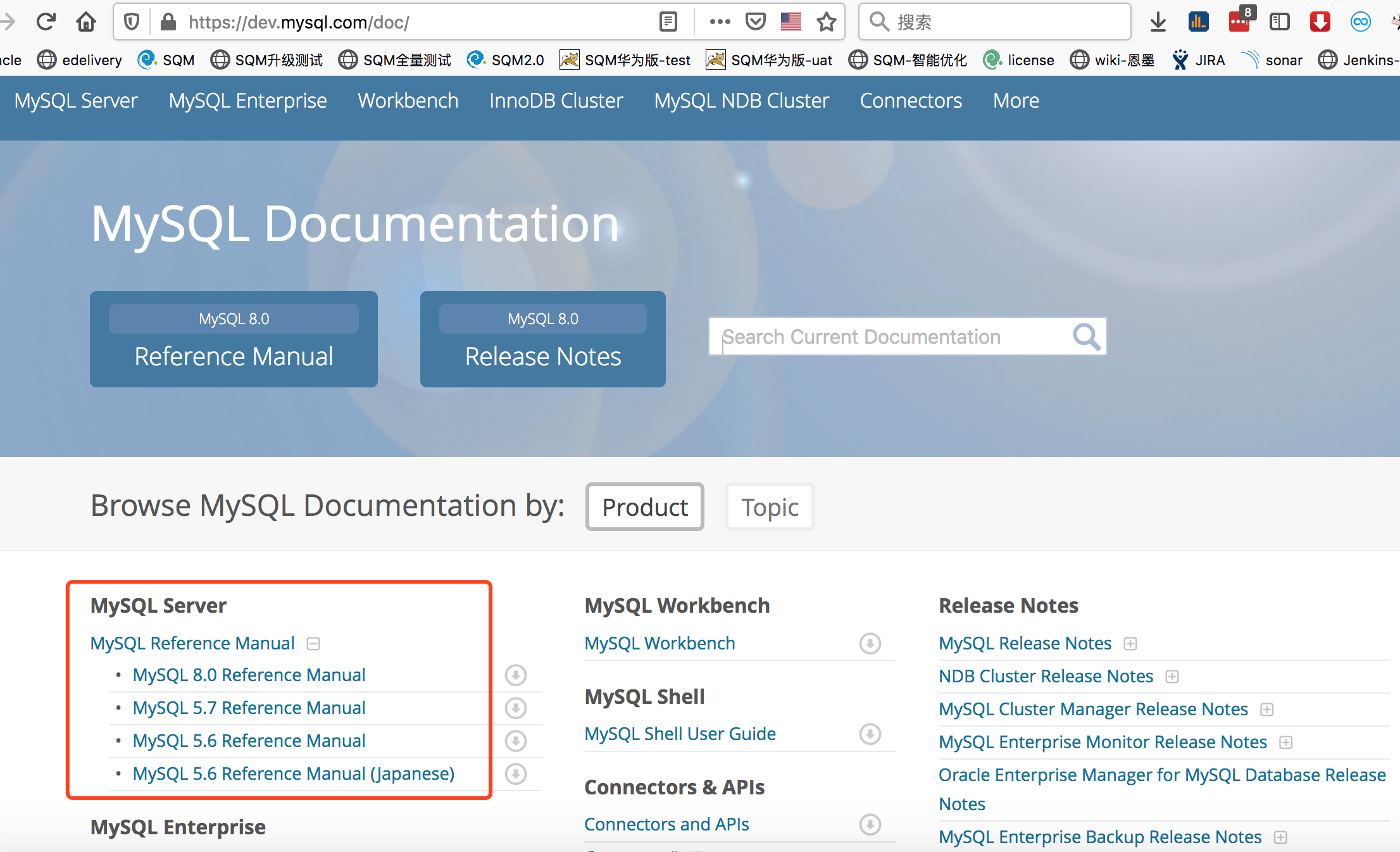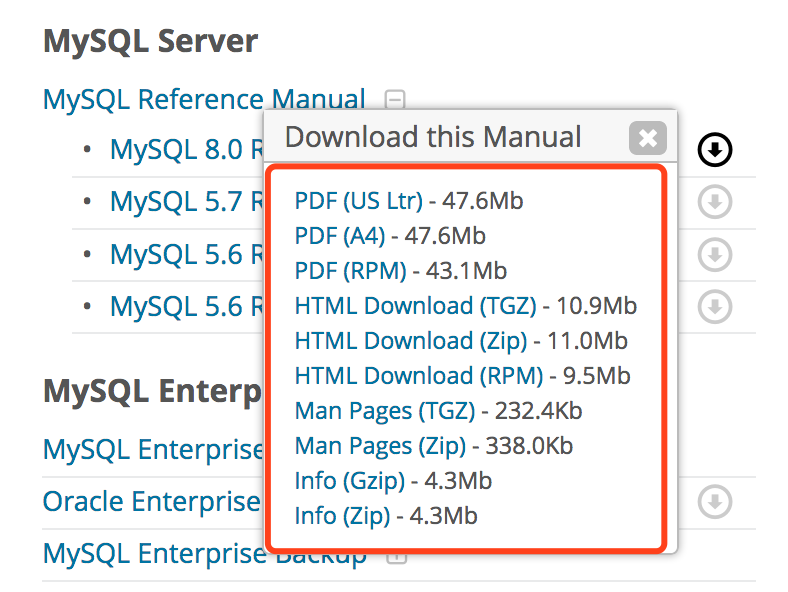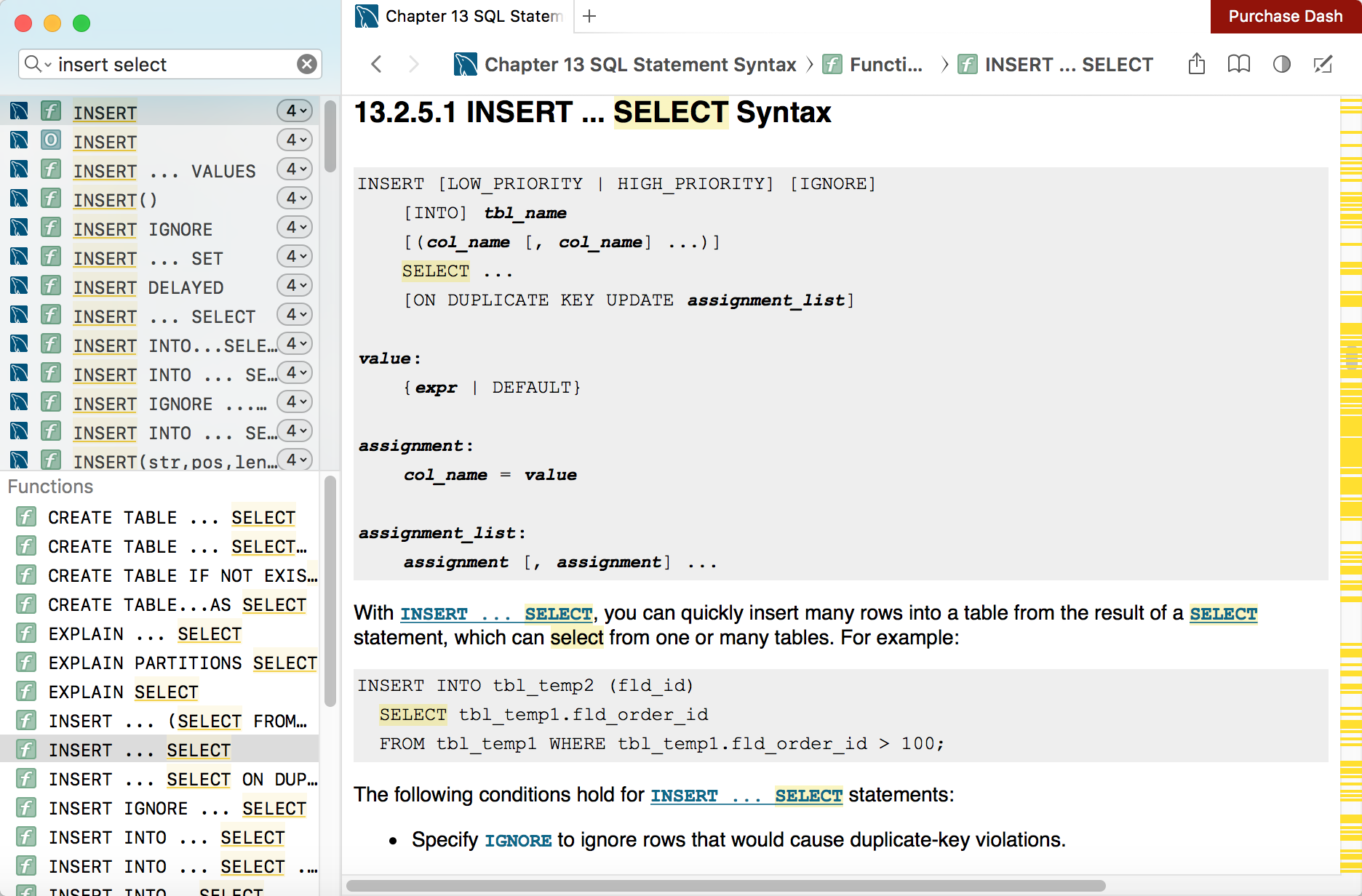在MySQL的使用中,可能会经常遇到各种问题:
- 某个语法忘了,如何快速查找?
- 想知道某种数据类型的详细说明?
- 想知道某个函数的参数说明?
- …
对于这些问题,我较常用三种方式。
官方文档
通过在线方式查阅官方文档。https://dev.mysql.com/doc/

如果担心网络,可以点击帮助后的小图标,将帮助下载到本地,随时随地自由翻阅。下载时还有多种格式选择,我个人最喜欢pdf格式。

工具,比如Dash
Dash是一款非常优秀的工具,通过Dash可以浏览各种文档,以及管理代码片段。https://kapeli.com/dash
贴一段官方说明。
Dash comes with 200+ offline documentation sets. You can choose which documentation sets to download and Dash will take care of the rest, making sure they are kept up to date. You can also generate your own docsets, request docsets or download docsets from third-party sources.
Listed below are all the various documentation sets Dash comes with. The most popular ones are highlighted. All documentation sets have been generated and are maintained with the utmost care.
真的很厉害,从操作系统到开发语言、数据库等等,当然MySQL的帮组也涵盖其中,查起来很方便。

MySQL安装后自带的帮助文档
在MySQL命令行中,使用?即可方便的查阅帮助。如果不知道帮助有什么内容,可以用“? contents”命令来显示所有可供查询的分类。
root@database-one 23:33: [(none)]> ? contents
You asked for help about help category: "Contents"
For more information, type 'help <item>', where <item> is one of the following
categories:
Account Management
Administration
Compound Statements
Data Definition
Data Manipulation
Data Types
Functions
Functions and Modifiers for Use with GROUP BY
Geographic Features
Help Metadata
Language Structure
Plugins
Procedures
Storage Engines
Table Maintenance
Transactions
User-Defined Functions
Utility
列出来的分类,可以使用“? 分类名称”进一步查看。
root@database-one 23:39: [(none)]> ? Functions
You asked for help about help category: "Functions"
For more information, type 'help <item>', where <item> is one of the following
categories:
Bit Functions
Comparison operators
Control flow functions
Date and Time Functions
Encryption Functions
Information Functions
Logical operators
Miscellaneous Functions
Numeric Functions
String Functions
root@database-one 23:39: [(none)]> ? Information Functions
You asked for help about help category: "Information Functions"
For more information, type 'help <item>', where <item> is one of the following
topics:
BENCHMARK
CHARSET
COERCIBILITY
COLLATION
CONNECTION_ID
CURRENT_USER
DATABASE
FOUND_ROWS
LAST_INSERT_ID
ROW_COUNT
SCHEMA
SESSION_USER
SYSTEM_USER
USER
VERSION
上面列出了所有的信息函数,如果想知道VERSION函数的具体用法,也可以进一步查看。
root@database-one 23:39: [(none)]> ? VERSION
Name: 'VERSION'
Description:
Syntax:
VERSION()
Returns a string that indicates the MySQL server version. The string
uses the utf8 character set. The value might have a suffix in addition
to the version number. See the description of the version system
variable in
http://dev.mysql.com/doc/refman/5.7/en/server-system-variables.html.
URL: http://dev.mysql.com/doc/refman/5.7/en/information-functions.html
Examples:
mysql> SELECT VERSION();
-> '5.7.17-standard'
通过说明,我们清晰的知道了,原来VERSION函数是用来查询数据库版本的。
?命令后边可以跟上任何关键字,都会快速的显示帮助,比如:
root@database-one 23:45: [(none)]> ? create table
Name: 'CREATE TABLE'
Description:
Syntax:
CREATE [TEMPORARY] TABLE [IF NOT EXISTS] tbl_name
(create_definition,...)
[table_options]
[partition_options]
CREATE [TEMPORARY] TABLE [IF NOT EXISTS] tbl_name
[(create_definition,...)]
[table_options]
[partition_options]
[IGNORE | REPLACE]
[AS] query_expression
CREATE [TEMPORARY] TABLE [IF NOT EXISTS] tbl_name
{ LIKE old_tbl_name | (LIKE old_tbl_name) }
create_definition:
col_name column_definition
| [CONSTRAINT [symbol]] PRIMARY KEY [index_type] (index_col_name,...)
[index_option] ...
| {INDEX|KEY} [index_name] [index_type] (index_col_name,...)
[index_option] ...
| [CONSTRAINT [symbol]] UNIQUE [INDEX|KEY]
[index_name] [index_type] (index_col_name,...)
[index_option] ...
| {FULLTEXT|SPATIAL} [INDEX|KEY] [index_name] (index_col_name,...)
[index_option] ...
| [CONSTRAINT [symbol]] FOREIGN KEY
[index_name] (index_col_name,...) reference_definition
| CHECK (expr)
column_definition:
data_type [NOT NULL | NULL] [DEFAULT default_value]
[AUTO_INCREMENT] [UNIQUE [KEY] | [PRIMARY] KEY]
[COMMENT 'string']
[COLUMN_FORMAT {FIXED|DYNAMIC|DEFAULT}]
[STORAGE {DISK|MEMORY|DEFAULT}]
[reference_definition]
| data_type [GENERATED ALWAYS] AS (expression)
[VIRTUAL | STORED] [UNIQUE [KEY]] [COMMENT comment]
[NOT NULL | NULL] [[PRIMARY] KEY]
data_type:
BIT[(length)]
| TINYINT[(length)] [UNSIGNED] [ZEROFILL]
| SMALLINT[(length)] [UNSIGNED] [ZEROFILL]
| MEDIUMINT[(length)] [UNSIGNED] [ZEROFILL]
| INT[(length)] [UNSIGNED] [ZEROFILL]
| INTEGER[(length)] [UNSIGNED] [ZEROFILL]
| BIGINT[(length)] [UNSIGNED] [ZEROFILL]
| REAL[(length,decimals)] [UNSIGNED] [ZEROFILL]
| DOUBLE[(length,decimals)] [UNSIGNED] [ZEROFILL]
| FLOAT[(length,decimals)] [UNSIGNED] [ZEROFILL]
| DECIMAL[(length[,decimals])] [UNSIGNED] [ZEROFILL]
| NUMERIC[(length[,decimals])] [UNSIGNED] [ZEROFILL]
| DATE
| TIME[(fsp)]
| TIMESTAMP[(fsp)]
| DATETIME[(fsp)]
| YEAR
| CHAR[(length)] [BINARY]
[CHARACTER SET charset_name] [COLLATE collation_name]
| VARCHAR(length) [BINARY]
[CHARACTER SET charset_name] [COLLATE collation_name]
| BINARY[(length)]
| VARBINARY(length)
| TINYBLOB
| BLOB
| MEDIUMBLOB
| LONGBLOB
| TINYTEXT [BINARY]
[CHARACTER SET charset_name] [COLLATE collation_name]
| TEXT [BINARY]
[CHARACTER SET charset_name] [COLLATE collation_name]
| MEDIUMTEXT [BINARY]
[CHARACTER SET charset_name] [COLLATE collation_name]
| LONGTEXT [BINARY]
[CHARACTER SET charset_name] [COLLATE collation_name]
| ENUM(value1,value2,value3,...)
[CHARACTER SET charset_name] [COLLATE collation_name]
| SET(value1,value2,value3,...)
[CHARACTER SET charset_name] [COLLATE collation_name]
| JSON
| spatial_type
index_col_name:
col_name [(length)] [ASC | DESC]
index_type:
USING {BTREE | HASH}
index_option:
KEY_BLOCK_SIZE [=] value
| index_type
| WITH PARSER parser_name
| COMMENT 'string'
reference_definition:
REFERENCES tbl_name (index_col_name,...)
[MATCH FULL | MATCH PARTIAL | MATCH SIMPLE]
[ON DELETE reference_option]
[ON UPDATE reference_option]
reference_option:
RESTRICT | CASCADE | SET NULL | NO ACTION
table_options:
table_option [[,] table_option] ...
table_option:
ENGINE [=] engine_name
| AUTO_INCREMENT [=] value
| AVG_ROW_LENGTH [=] value
| [DEFAULT] CHARACTER SET [=] charset_name
| CHECKSUM [=] {0 | 1}
| [DEFAULT] COLLATE [=] collation_name
| COMMENT [=] 'string'
| COMPRESSION [=] {'ZLIB'|'LZ4'|'NONE'}
| CONNECTION [=] 'connect_string'
| DATA DIRECTORY [=] 'absolute path to directory'
| DELAY_KEY_WRITE [=] {0 | 1}
| ENCRYPTION [=] {'Y' | 'N'}
| INDEX DIRECTORY [=] 'absolute path to directory'
| INSERT_METHOD [=] { NO | FIRST | LAST }
| KEY_BLOCK_SIZE [=] value
| MAX_ROWS [=] value
| MIN_ROWS [=] value
| PACK_KEYS [=] {0 | 1 | DEFAULT}
| PASSWORD [=] 'string'
| ROW_FORMAT [=] {DEFAULT|DYNAMIC|FIXED|COMPRESSED|REDUNDANT|COMPACT}
| STATS_AUTO_RECALC [=] {DEFAULT|0|1}
| STATS_PERSISTENT [=] {DEFAULT|0|1}
| STATS_SAMPLE_PAGES [=] value
| TABLESPACE tablespace_name
| UNION [=] (tbl_name[,tbl_name]...)
partition_options:
PARTITION BY
{ [LINEAR] HASH(expr)
| [LINEAR] KEY [ALGORITHM={1|2}] (column_list)
| RANGE{(expr) | COLUMNS(column_list)}
| LIST{(expr) | COLUMNS(column_list)} }
[PARTITIONS num]
[SUBPARTITION BY
{ [LINEAR] HASH(expr)
| [LINEAR] KEY [ALGORITHM={1|2}] (column_list) }
[SUBPARTITIONS num]
]
[(partition_definition [, partition_definition] ...)]
partition_definition:
PARTITION partition_name
[VALUES
{LESS THAN {(expr | value_list) | MAXVALUE}
|
IN (value_list)}]
[[STORAGE] ENGINE [=] engine_name]
[COMMENT [=] 'comment_text' ]
[DATA DIRECTORY [=] 'data_dir']
[INDEX DIRECTORY [=] 'index_dir']
[MAX_ROWS [=] max_number_of_rows]
[MIN_ROWS [=] min_number_of_rows]
[TABLESPACE [=] tablespace_name]
[(subpartition_definition [, subpartition_definition] ...)]
subpartition_definition:
SUBPARTITION logical_name
[[STORAGE] ENGINE [=] engine_name]
[COMMENT [=] 'comment_text' ]
[DATA DIRECTORY [=] 'data_dir']
[INDEX DIRECTORY [=] 'index_dir']
[MAX_ROWS [=] max_number_of_rows]
[MIN_ROWS [=] min_number_of_rows]
[TABLESPACE [=] tablespace_name]
query_expression:
SELECT ... (Some valid select or union statement)
CREATE TABLE creates a table with the given name. You must have the
CREATE privilege for the table.
Rules for permissible table names are given in
http://dev.mysql.com/doc/refman/5.7/en/identifiers.html. By default,
the table is created in the default database, using the InnoDB storage
engine. An error occurs if the table exists, if there is no default
database, or if the database does not exist.
URL: http://dev.mysql.com/doc/refman/5.7/en/create-table.html
root@database-one 23:45: [(none)]>
© 2020, morinson. 版权所有. 欢迎转载,但请保留作者及出处。